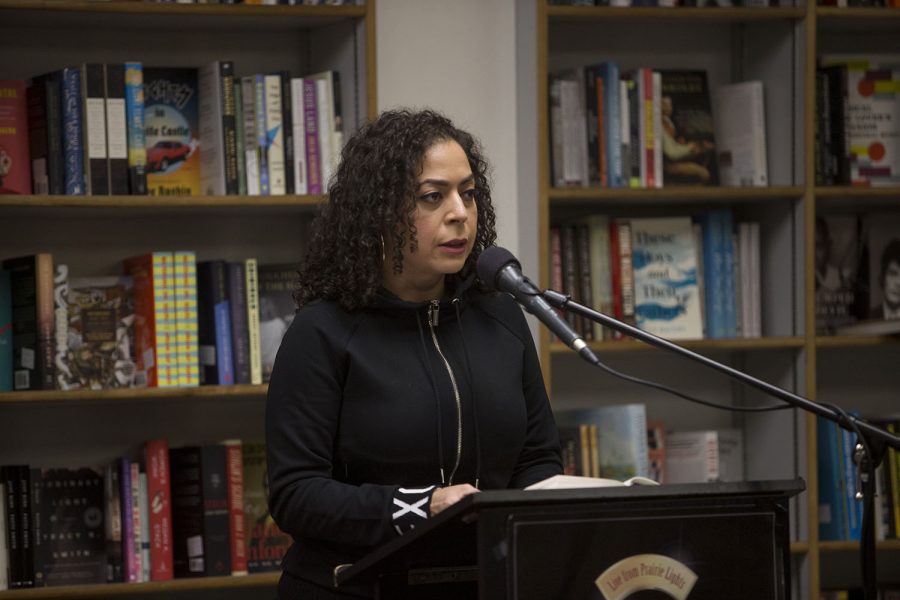Review: Jaquira Diaz’s memoir, ‘Ordinary Girls’ is no ordinary story
Jaquira Diaz made an emotional appearance at Prairie Lights to read from her newest book, ‘Ordinary Girls: A Memoir.’
Author Jaquira Díaz reads from her memoir, Ordinary Girls, during a Live From Prairie Lights event on Tuesday, Nov. 5, 2019. Ordinary Girls details her life growing up in Puerto Rico and Miami Beach and the struggles she faced. Díaz is the recipient of a variety of fellowships and awards for her work and is currently a Visiting Assistant Professor at the University of Wisconsin-Madison’s MFA program in Creative Writing.
November 7, 2019
The following review contains sensitive content involving mentions of physical abuse, sexual assault, and suicide, which may be disturbing to some people.
Do you know that feeling when you start a new book and you immediately know it’s going to change your life in one way or another? That’s exactly how I felt the moment I began reading Jaquira Diaz’s memoir, Ordinary Girls.
Diaz is a Puerto Rican essayist, writer, journalist, and cultural critic. Her work has made an appearance in a multitude of literary sites including The Kenyon Review, Rolling Stone, and Tin House.
According to The Kenyon Review, “Diaz is the recipient of two Pushcart Prizes, an Elizabeth George Foundation Grant, and fellowships from the Wisconsin Institute for Creative Writing and the MacDowell Colony.
Although these awards aren’t for this book in particular, as it was released on Oct. 29, Ordinary Girls is bound to make a change in the literary world.
The book is broken up into four parts: “Madre Patria,” “Monstruo,” “Familia,” and “Regresando,” each portion highlighting both the positive and negative aspects of Diaz’s life.
“I would describe it as a book about friendship and family, about our parents and how their actions shape us, and about how we’re not defined by the worst thing we’ve ever done, but it’s also about being what I would call an ordinary girl who wasn’t seen,” Diaz said during her reading at Prairie Lights.
Throughout her memoir, Diaz discusses several painful points in her life, from the violence she experienced as a teenager, drug abuse by both her parents and herself, physical abuse from her family members, multiple sexual assaults, and suicidal thoughts and actions — including her own attempts.
The number of times that this book sent chills down my spine are innumerable. It’s so extremely, heart-breakingly personal. My copy of Ordinary Girls now has tear-stained pages from cover to cover, whether they were tears of sadness or anger, such as when reading about Diaz’s many suicide attempts, or from joy and excitement, while reading the very end of the book.
“I will know that I was lucky to find them, the kind of friends who slowly, slowly, love you back to life,” are the words that end the memoir.
In addition to bringing to the page the dismal, yet powerful realities of her life, Diaz’ Ordinary Girls also briefly highlights major Puerto Rican history, such as the ‘50s gag law meant to suppress activists. It became a crime to display or own a Puerto Rican flag, to sing “La Borinqueña,” and to organize or speak against the United States government.
During her reading at Prairie Lights on Nov. 5., Diaz read from a selection of the most influential sections of the book. She wrote her memoir in many different first-person points of view, and for a very unique reason.
“I wanted that first person plural to be a voice that every girl could hear or every woman could hear and that it would resonate,” Diaz said. “I intended it to be clear that this was something I wrote while I was looking towards home.”
National and local resources for individuals in need of support are available on the University of Iowa campus, in the Iowa City area, and/or by phone:
• University Counseling Services – (319) 335-7294
• Student Care and Assistance – (319) 335-1162
• UI Employee Assistance Program – (319) 335-2085
• CommUnity Crisis Services – (319) 351-0140
• RVAP Crisis Line – (319) 335-6000, (800) 228-1625
• Iowa Sexual Abuse Hotline (800) 284-7821
• National Suicide Prevention Lifeline: 1-(800) 273-8255



